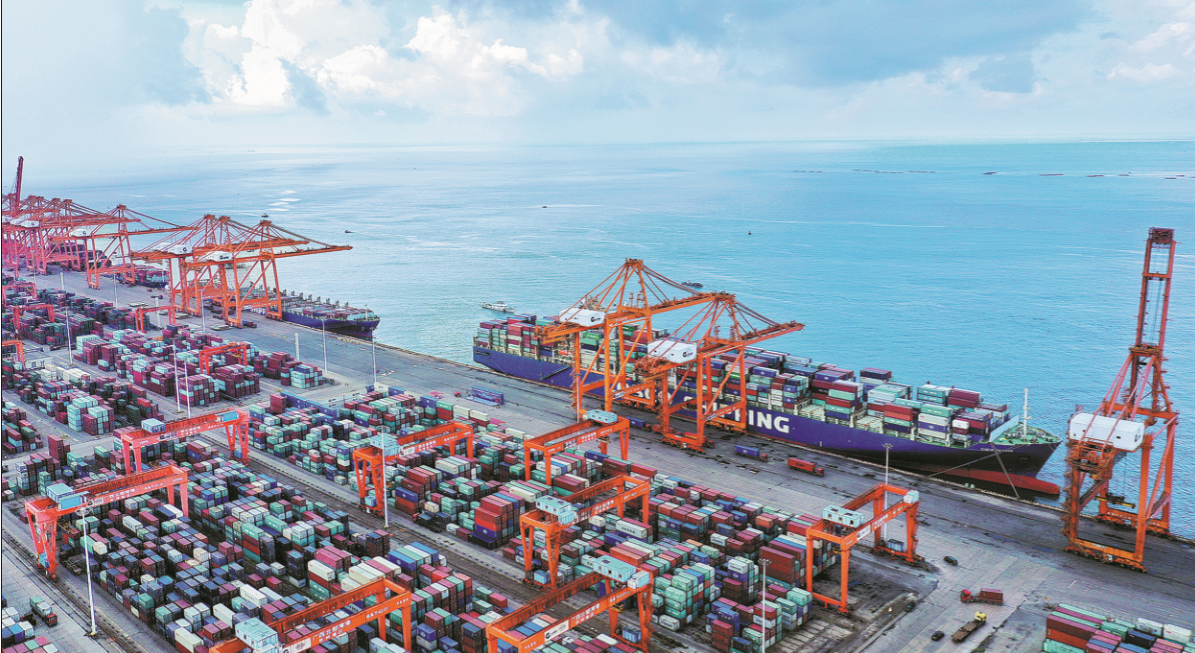CPTPP, DEPA set to promote digital economy


In the Government Work Report delivered to the 14th National People's Congress on March 5, Premier Li Keqiang called for active participation in higher-quality trade agreements including the Comprehensive and Progressive Agreement for Trans-Pacific Partnership and the Digital Economy Partnership Agreement, which China has applied to join, in order to further open up its economy to the outside world.
The headwinds faced by economic globalization, the escalating geopolitical tensions, and the changing international rules have accelerated the development of bilateral and regional free trade agreements.
In the new era, China is promoting FTAs in a bid to construct a new development pattern. It has signed 19 FTAs with 26 countries and regions, and has formed a network of free trade zones focused on East Asia with their benefits spreading to the Belt and Road countries and the Asia-Pacific economic community.
China's formal application in 2021 to join the CPTPP will help widen China's free trade zone network while making it more efficient. Considered by some to be the largest FTA in terms of openness and standards, the CPTPP leads the way in making global economic and trade rules, which include those on digital products and services, and telecom service regulations.
The DEPA is the world's first dedicated agreement on cross-border cooperation in the digital economy.
As a leading country in the number of patents authorized for key digital technologies such as artificial intelligence, the Internet of Things, and quantum information in 2022, China had 325,000 patents approved for core industries in the digital economy. The core industry's scale in the industrial internet reached 1.2 trillion yuan ($144.32 billion), with the big data industry's scale reaching 1.57 trillion yuan, making China one of the world's fastest-growing cloud computing markets.
The DEPA focuses on using innovative technology to collect data and is committed to promoting the inclusive development of the digital economy, while the CPTPP has provisions for "information sharing".
So, by joining both the CPTPP and the DEPA, China can enhance cross-border trade cooperation in industries such as communications and information technology, big data and AI, and expedite its digital transformation.
Experts say the scale of China's digital economy ought to have exceeded $5 trillion yuan last year, growing about 10 percent year-on-year. And while digital service trade in the first half of 2022 reached 1.2 trillion yuan, up 9.8 percent year-on-year, digital service exports touched 682.8 billion yuan, up 13.1 percent year-on-year.
The CPTPP and the DEPA will make digital trade more convenient, promote the free flow of data across borders, help increase the participation of small and medium-sized enterprises and consumers in the digital economy, and boost digital service trade, thereby creating bigger digital service markets.
Also, since external factors such as the Russia-Ukraine conflict and high global inflation have made the global supply chains more susceptible to disruptions, using rules for the digital economy to build the digital industry chains will help maintain the security and stability of the global supply chains.
As of June 2022, the digitalization rate of key processes in China's manufacturing industry was 55.7 percent, and the popularity rate of digital R&D design tools was 75.1 percent — with synergistic digital models and new forms of businesses booming. By joining the CPTPP and the DEPA, China can make full use of the rules on data utilization and digital inclusiveness to expedite the development of its digital industry chains.
To establish high-standard digital trade rules, China needs to expand institutional opening-up and deepen reforms in related areas. In fact, to facilitate investment management system reform, China has issued the Special Management Measures for the Access of Foreign Investment (Negative List) (2021), which has strict rules on foreign investment in the online culture industry. For example, unlike the CPTPP and the DEPA, it prohibits investment in the editing, publishing and production of books, newspapers, periodicals, audio-visual products and electronic publications.
That's why it is necessary to carry out in-depth reforms in the investment management system, gradually ease market access in the digital economy sector, strengthen protection for foreign investors, and improve the litigation mechanism for foreign-funded enterprises.
There is also a need to establish a comprehensive legal and regulatory system for digital governance, improve laws and regulations on cross-border data free flow, data storage localization, and non-discriminatory treatment of digital products to ensure the openness of, and better secure, internet information.
To this end, China should revise the Personal Information Protection Law, Cybersecurity Law and some other laws to make them compatible with the rules of the CPTPP and the DEPA, so as to expedite the advancement of the country's digital economy.
Wang Jun is a professor at, and the dean of, the Institute of International Economic and Trade Research, Guang dong University of Foreign Studies; and Zhang Fan is a PhD candidate at the same institute.
The views don't necessarily reflect those of China Daily.


































